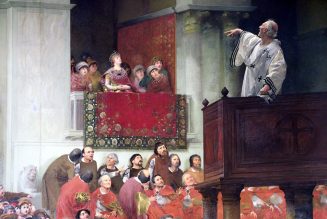Bacchus. Adobe Stock
He’s usually depicted in the middle of an orgy or a debauch. We usually see Bacchus, the Roman god of agriculture, fertility and wine, eating and drinking and making merry, and in a way that in the real world, for us non-gods, ends in tears. (Maybe not ours, but someone’s.)
America had its own Bacchus in Hugh Hefner, now the subject of an apparently blistering A&E documentary called “Secrets of Playboy.” I won’t go into the details, which are sordid, but he hurt many, many people — not just the young women who were exploited and even raped, but the men who indulged themselves under his guidance. And all the men induced to lust by his magazine, and all the people who bought into his idea of the good life. And all their victims.
Hefner’s idea of the good life wasn’t just grossly libertine, but grossly materialistic. The good life means having things — lots of things, lots of expensive things. Among those things the ideal playboy owned was young women’s bodies. The ideal playboy is a “man of taste,” a “gentleman.” What he isn’t is chaste, nor brave, kind, altruistic or holy.
That’s the bacchanalian life, the modern version of the life of Bacchus. Yet, if I may put it this way, our Father wants us to live the truly Bacchanalian life — Bacchus’s life Christianized. Like many pagan stories, his story points to a truth that Christianity sees clearly and fully. God wants us to live the life of which Hefner’s hound dog lust was a gross parody. God wants us to enjoy all the pleasures his created world offers — the proper pleasures, properly enjoyed.
Lent trains us for this life. All its disciplines and deprivations help us to enjoy real pleasures, which opens us to the deep pleasures of life in Christ. How this works would take another article. It’s enough here to say that the closer we get to real things, and to enjoying them for themselves, the more open we become to Reality Himself.
C.S. Lewis’ archtempter, Screwtape, knew this. His inept nephew, Wormwood, has let his “patient” convert to Christianity by letting him enjoy real pleasures.
“You first of all allowed the patient to read a book he really enjoyed, because he enjoyed it, and not in order to make clever remarks about it to his new friends,” he says. That was bad enough. Worse, “You allowed him to walk down to the old mill and have tea there — a walk through country he really likes, and taken alone. In other words, you allowed him too real positive Pleasures.”
Screwtape had already explained this to Wormwood. “Never forget that when we are dealing with any pleasure in its healthy and normal and satisfying form, we are, in a sense, on the Enemy’s ground. I know we have won many a soul through pleasure. All the same, it is His invention, not ours.”
Real pleasures “peel off from his sensibility the kind of crust you have been forming on it, and make him feel that he was coming home, recovering himself,” he says. “As a preliminary to detaching him from the Enemy, you wanted to detach him from himself.” To be a man who reads books to impress his friends and not because he enjoys the story, for example.
Lent gives us a chance once a year to learn how better to enjoy the pleasures God gives us. When people talk about Lent, a lot of people like to say it’s not about giving up things but adding things, etc., but let’s not underestimate the value of giving up things. Lent teaches us how much we can do without.
It also teaches us what we really like. The simplest way to learn to enjoy something is to stop doing it for a while.
Early in my Catholic life, I gave up coffee for Lent. Not the smartest idea, I saw just a few days in. But when on Easter Sunday morning, I had my first cup after seven long weeks, I thought, “This must be what heroin is like.” I’d been knocking the stuff down and had long lost the ability to enjoy it. It really had become only a drug. It returned (for a while) to being a pleasure.
That’s a small example. You learn something about the pleasure of words through periods of silence, and the pleasure of sleep by rising early to pray. You get a better idea of the things that make you happy by giving money to those who need it, and not spending it on yourself.
We do build up a crust, stupidly but predictably. It keeps us from feeling God’s gifts as we should. Lent helps us scrape it off. Lent makes life more fun.
David Mills writes from Pennsylvania.
Join Our Telegram Group : Salvation & Prosperity









